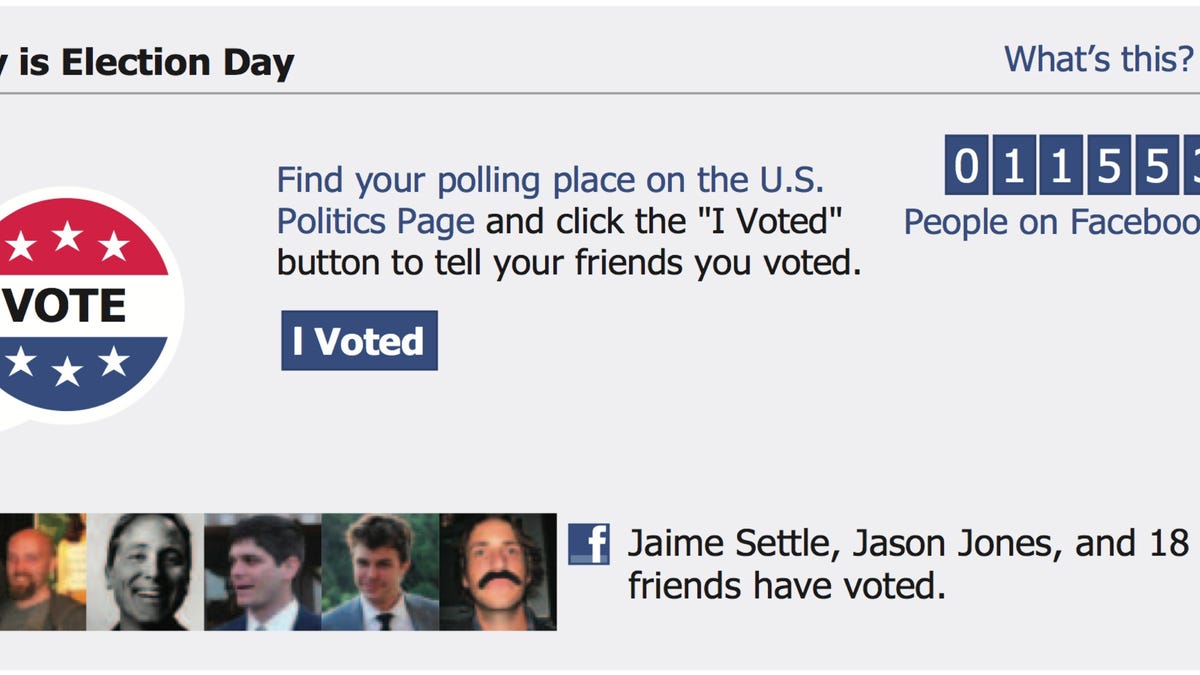Facebook uses peer pressure to bring out the vote
A new study shows that when users' friends click Facebook's "I Voted" button, they're more likely to do the same. In 2010, this message reportedly brought 300,000 more voters to the polls.

Facebook may be wielding the power of the polls with peer pressure. According to a new study, when users see that their friends have voted, they're far more likely to go vote themselves.
Titled "A 61-million-person experiment in social influence and political mobilization," the study examines the influence of Facebook friends on voting behaviors. It looks specifically at the U.S. elections in 2010 and concludes that the social network's "get out the vote" message brought more than 300,000 more voters to the polls.
"Our study suggests that social influence may be the best way to increase voter turnout," University of California San Diego professor and lead author of the study James Fowler said in a statement. "Just as importantly, we show that what happens online matters a lot for the 'real world.'"
According to Fowler, the hundreds of thousands of additional voters in 2010 were because of one non-partisan Facebook message on Election Day that said, "Today is Election Day" and had a clickable "I Voted" button along information on polling places and six profile photos of friends who said they voted.
Unbeknownst to Facebook users in 2010, however, researchers were conducting an experiment. About 600,000 users were randomly assigned to see the exact same message but without the six photos of friends. And another 600,000 didn't see any message at all.
Once the polls closed, the researchers analyzed each of the group's behavior. They found that users who saw their friends voted, overwhelmingly did the same -- they looked up polling places and clicked the "I Voted" button.
Of course some people could have just been clicking and not voting, but the researchers thought of a way to figure that out too. Using publicly available voting records, they were able to compare who voted and who didn't without ever knowing the identity of the users. Only 4 percent of voters who said they voted, actually didn't.
What's more, those users who saw the message with the photos had the highest voting rates. Those who got the message without the photos had the same rate as those who didn't get any message at all. The peer pressure also was seen extending beyond direct friends -- to friends of friends -- giving the "I Voted" button a ripple effect.
Fowler believes that Facebook brought in four more voters for every one voter that was voting regardless of their friend's behavior.
"Social influence made all the difference in political mobilization," Fowler said. "It's not the 'I Voted' button, or the lapel sticker we've all seen, that gets out the vote. It's the person attached to it."
The power of social media is something President Barack Obama has already gleaned. He is the first known president to have a Facebook account and has since upped his social media presence by joining Twitter, Pinterest, Google+, Instagram, and more. Republican nominee Mitt Romney has jumped on board too with Facebook and Twitter accounts.
The researchers did not find any difference between self-described liberals and conservatives and whether they were influenced to vote.

